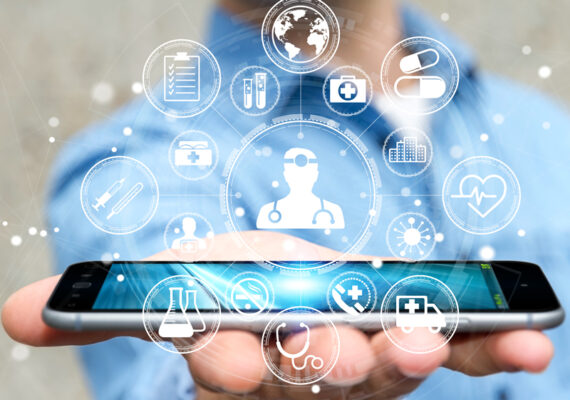
The Use of Mobile Devices in Healthcare
Last updated on June 23rd, 2022 at 04:30 am
Medical professionals are increasingly relying on the use of mobile devices as part of their work, using them to store patient data and provide essential healthcare functions. This guest post from Home Healthcare Adaptations shows how mobile devices could aid the work of medical professionals.
What is Mobile Health Technology?
Mobile health (or “mHealth” for short) technology is defined by the Foundation for the National Institutes of Health (FNIH) as “the delivery of healthcare services via mobile communication devices”. mHealth tech can be used to support a diverse range of tasks and to improve the quality of healthcare delivery.
8 Statistics to Know about Mobile Healthcare Technology
- The mobile healthcare technology market is projected to reach a value of €53 billion ($60bn) by 2020. (MarketsAndMarkets)
- 93% of medical professionals believe that mobile health apps can help to improve patients’ health. (GreatCall)
- 74% of hospitals that use mobile devices to collect information from patients are more efficient than those which don’t. (Ricoh Research)
- 4 out of 5 doctors use their mobile devices to assist with their everyday work. (Skycure)
- 43% of doctors have used their mobile devices as the primary screen for accessing patients’ data. (Mobile Threat Intelligence Report)
- 84% of healthcare providers use mobile devices for post-hospital discharge support. (Fierce Mobile Healthcare IT)
- 28% of medical professionals store patients’ data on their mobile devices. (Skycure)
- 25% of doctors use mobile devices to deliver care to patients. (GreatCall)
How Are Mobile Devices Used in Healthcare Provision?
Collaborations between app developers and medical professionals are discovering new ways to improve healthcare delivery through technology. Many apps have been developed that enhance and supplement healthcare delivery across a range of functions, including:
- The provision of training, CPD and support to medical professionals
- Public health education campaigns
- Access to information for health care professionals at point of care
- Emergency response systems
- Health epidemic surveillance
- Community mobilisation programmes
- The remote monitoring of patients
- Support for chronic care management such as diabetes, insomnia and cancer
- Patient appointment and medication reminders
- Chronic disease management
What Are the Benefits of mHealth Technology?
- The use of mobile devices allows medical and healthcare professionals to easily access patients’ electronic health records and data. This has a positive knock-on effect on productivity.
- These tools enhance communication and collaboration among medical professionals. This streamlines processes and patients enjoy a better quality of care as a result.
- In addition, the use of mHealth apps can facilitate improved communications between patients and healthcare providers. Patients can take a more active role in their healthcare management by using apps to track symptoms and medication usage.
- The digitisation of paperwork means that important data is far less likely to be lost, destroyed or mishandled.
- Busy medical professionals will spend less time on administrative duties.
- The efficiencies brought about by apps will free up resources, space and time for overstretched medical professionals.
- Mobile health technology may significantly improve access to healthcare services in traditionally under-resourced areas (e.g. remote locations or developing regions). The roll-out of mHealth programmes could offer a cost-effective way to support healthcare functions in such areas.
What is Driving the Growth of the mHealth Market?
Experts attribute the impressive rise of mHealth to the proliferation of smartphones and internet access across the world. Currently, a whopping 67% of the world’s population uses a smartphone. Smartphones, internet access and healthcare apps empower people to take more control of their health. This is especially true in locations with poor access to healthcare and medical facilities.
Concerns Over Mobile Usage in Healthcare
Some people are anxious that the reliance on cloud storage could give rise to data protection and security issues. If a mobile device is stolen, then sensitive patient data could find its way into the wrong hands. What’s more, medical staff may share sensitive patient information outside of secure servers (e.g. information sent via SMS or third-party messaging apps). This means that the healthcare professionals of today have a responsibility to keep these devices safe and secure.
Author Bio:
Michael Leavy is a Managing Director of Home Healthcare Adaptations. As part of my role, I enjoy researching and producing informative content on technological advances in the healthcare sector.”
